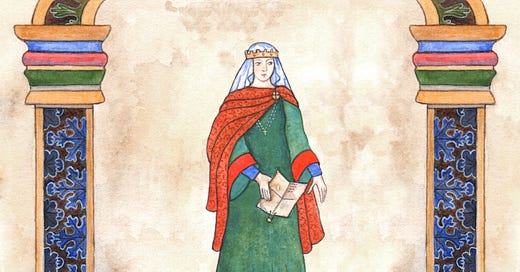Deconstructing the heavily masculine narrative of early medieval England: Æthelburh, Queen of the Northumbrians (c. A.D. 601 - c. A.D. 647)
Rediscovering Medieval Women
It’s an enduring frustration of mine that the bulk of early medieval texts in England were written by men and for men.
I have nothing against men in general or medieval men in particular. I even did previous research on the cultural and political development of kingship in 6th- and 7th-century England! You can’t get much more ‘pro-medieval-men’ than that.
The thing that irks me about men controlling writing in this period, though, is that they wrote for very particular purposes and women didn’t often feature highly on their agendas.
It’s therefore a very one-sided and heavily masculine narrative that has been passed down to us for the earliest years of the medieval age.
And yet we know, of course, that women not only existed but that they contributed productively to this emerging political and cultural landscape.
This essay is part of a series of biographies aimed at resurrecting the lives and voices of women standing in the shadows of the historical narratives - those who played vital roles yet were excluded from the records - whose stories have a right to be told. For too long they’ve been famous for being the wives / sisters / daughters / mothers of more famous men, and it’s time they enjoyed the limelight in their own right
You can read the first biography here, telling the story of Bertha, Queen of Kent, a sixth-century Merovingian princess who married a foreign prince below her status following the death of her excommunicated father, yet transformed her new kingdom, and subsequently the whole of Anglo-Saxon England, through her devoted Christian life. The dominant narratives, of course, ascribe that victory to the men who lived alongside her - but you’ll have to read the whole essay to hear that story.
Do make sure you’re subscribed to avoid missing out on later essays, covering queens, saints, and locally-significant women.
These biographies are for paid subscribers, as a lot of research and hard thought goes into them. Readers have a single-use ‘unlock’ to read this paid material, which you can access at the paywall below. If you are in genuine financial difficulty but still want to dive headlong into medieval women’s history, feel free to send me a message via the Substack app and I’ll happily gift you a month’s free membership to read the post.




